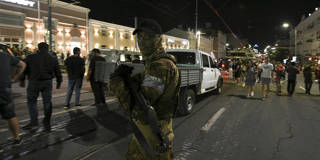NINA L. KHRUSHCHEVA
 Russian President Vladimir Putin’s response to the rebellion by Wagner Group boss Yevgeny Prigozhin was hardly that of a powerful leader or even a skilled tactician. Though Prigozhin turned back before reaching Moscow, Putin’s rivals are probably eyeing his throne.
Russian President Vladimir Putin’s response to the rebellion by Wagner Group boss Yevgeny Prigozhin was hardly that of a powerful leader or even a skilled tactician. Though Prigozhin turned back before reaching Moscow, Putin’s rivals are probably eyeing his throne.MOSCOW – Yevgeny Prigozhin may have called off his attempted coup just before his Wagner Group mercenaries reached Moscow, but the rebellion may nonetheless have fatally undermined Vladimir Putin’s regime. Days, weeks, or even months might pass before the cracks are fully exposed, but make no mistake: every crisis that ends with only the thinnest of resolutions, or none at all, further diminishes Putin’s stature, and thus whatever support he has left among Russia’s elites. His rivals are probably already eyeing the throne.
In the short run, Putin could spin the uprising’s failure in his favor. After all, the masses did not rise up to join the rebellion, as Prigozhin predicted, and Russia’s armed forces stood with the Kremlin, though only half-heartedly, as demonstrated by the fact that Chechen troops had to be sent to Rostov-on-Don to confront Prigozhin’s mercenaries. But, in time, it will become clear that none of this reflects the Putin regime’s strength.
Neither side, it seems, was confident that it could defeat the other. Though Prigozhin vehemently criticized Russia’s military brass, he denied that he was attempting a coup. Instead, he insisted that the Wagner advance on Moscow was a “march of justice” for the soldiers who had died in Ukraine because of the Russian military’s poor leadership – and even that mission was quickly cut short. Prigozhin knew that he could not sustain an assault on Moscow.
No comments:
Post a Comment